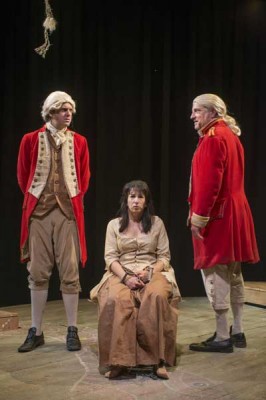Our Country’s Good
By Timberlake Wertenbaker
Directed by Roger Smart
Produced by Shattered Globe Theatre
At Theater Wit, Chicago
Strong accents and muddled tone makes period piece confusing
Shattered Globe Theatre, under the hyper direction of Roger Smart, have mounted an ambitious production of Wertenbaker’s 1988 adaptation of The Playmaker by Thomas Keneally now titled: Our Country’s Good. As presented, this play projects a confusing tone. Set in 1788 as the British begin the colonization of Australia, we meet a group of mean-spirited British officers and their prisoners: an unruly bunch of thieves, pickpockets, adulterers and prostitutes. We witness extreme cruelty by the British soldiers towards the prisoners including whipping, having wrists and ankles changed, starvation and even hanging. The contempt shown by the British soldiers led to corporal punishment for the slightest rule infraction.

Yet despite such conduct, the authorities decided to get the prisoners to put on a play so that they can become more “civilized” and thus elevate the group into a community. Really! It sure seems that Wertenbaker was bent on getting his view that the process of creating and performing theatre has magical redemptive powers that can transform criminals into worthy characters. That sure seems a stretch.

As problematic as the work’s premise is, I am confused by the tone. With the wildly over-played British accents and having women play males soldiers with an over-the-top manner and the prisoners, especially the women using hyper-accents, I’m not sure if Our Country’s Good is suppose to be a comedy or a parody or a satire? But with so much cruelty toward the prisoners by most of the soldiers, it is hard to see the piece as more than melodrama. Despite the sincere effort of 2nd Lieutenant Ralph Clark (Stephen Peeples), it sure is a stretch to believe that a group of prisoners sent to Australia for a minimum of seven years who are being constantly changed and whipped would so easily and eagerly want to become actors in a play! In reality, such cruelty would either get the inmates to revolt or escape. The only way they would put on a play if they were given their freedom upon mounting the play or some other positive long lasting incentive.
But since we are at the mercy of the playwright, we see the rehearsal process in action only interrupted by escapes attempts or whipping by the soldiers. In between, there are some funny actions and reactions as the playful process of turning tough uneducated folks into thespians unfolds. But I never truly bought the premise that these desperate prisoners would get so involved in the process of creating theatre. Rather, they’d spend their efferts escaping or preparing a revolt against their keepers. Also, once the food supply dwindled, you’d think that the authorities would get the prisoners to fish or grow crops rather than spend their energy doing theatre?
The production allowed the players to assume several roles yet the over authentic accents made some hard to understand. The tendency to over act some roles also hurt the production. These contradictory tones and the exhaustive two and a half hour length wore me out. While there were some terrific performances (Stephen Peebles in particular), the manic takes on many of the characters sent mixed messages. The commitment of the entire cast was evident; it’s the contradictory tone that troubled me. It’s the play that I question yet the production was nicely done.
Somewhat Recommended
Tom Williams
Talk Theatre in Chicago podcast
Date Reviewed: January 12, 2014
For more info checkout the Our Country’s Good page at theatreinchicago.com
At Theater Wit, 1229 W. Belmont, Chicago, IL, call 773-975-8150, www.shatteredglobe.org, tickets $30, under 30 $20, students $12, seniors $25, industry $15 on Thursdays. Thursdays thru Saturdays at 7:30 pm, Sundays at 3 pm, running time is 2 hours, 30 minutes with intermission, through February 22, 2014.
